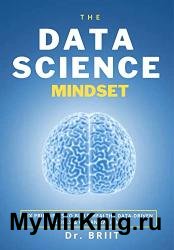 Название: The Data Science Mindset: 6 Principles To Build Healthy Data-Driven Skills & Organizations Название: The Data Science Mindset: 6 Principles To Build Healthy Data-Driven Skills & Organizations
Автор: Dr Briit
Издательство: Independently published
Год: 2021
Язык: английский
Формат: pdf, epub
Размер: 10.2 MB
All the information that you need to develop an effective Data Science skills and Mindset
Do you want to develop Data Science mindset that drive results in organisations?
Do you want to know the exact Data Science mindset and skills that Microsoft use to drive solutions to its customers?
Do you want to lead an organisational project that is driven by the right data mindsets.
Do you want to know how to successfully drive your projects with cross-functional data-driven culture?
Over half of all businesses are using data science to generate insights and value from big data. Data Scientist has been named as the No. 1 Best Job in the US and around the world. However, developing an effective data science skills and organisational culture is very challenging. In fact, according to Gartner, "60% of Data Science projects fail due to lack of the right data science mindset". "The Data Science Mindset" has all laid down 6 core principles that are leveraged by multinational companies such as Microsoft and McKinsey to drive results. This book features an expert Data Scientist from Microsoft and insights from McKinsey to provide real world case studies for a better understanding and learning. With the 6 proven principles in this book, you’ll learn exactly how to drive the desired results when performing a Data Science project.
Conventional software programs are hard-coded by humans with specific instructions on the tasks they need to execute. By contrast, it is possible to create algorithms that “learn” from data without being explicitly programmed. The concept underpinning Machine Learning is to give the algorithm a massive number of “experiences” (training data) and a generalized strategy for learning, then let it identify patterns, associations, and insights from the data. In short, these systems are trained rather than programmed. Some Machine Learning techniques, such as regressions, support vector machines, and k-means clustering, have been in use for decades. Others, while developed previously, have become viable only now that vast quantities of data and unprecedented processing power are available. Deep Learning, a frontier area of research within Machine Learning, uses neural networks with many layers (hence the label “deep”) to push the boundaries of machine capabilities. Data scientists have recently made breakthroughs using Deep Learning to recognize objects and faces and to understand and generate language. Reinforcement learning is used to identify the best actions to take now in order to reach some future goal. These type of problems are common in games but can be useful for solving dynamic optimization and control theory problems - exactly the type of issues that come up in modeling complex systems in fields such as engineering and economics. Transfer learning focuses on storing knowledge gained while solving one problem and applying it to a different problem. Machine Learning, combined with other techniques, could have an enormous range of uses.
In non-technical language, "The Data Science Mindset" outlines new perspectives and strategies to effectively develop a Data Science mindset both as an individual and as an organisation.
Скачать The Data Science Mindset: 6 Principles To Build Healthy Data-Driven Skills & Organizations
|